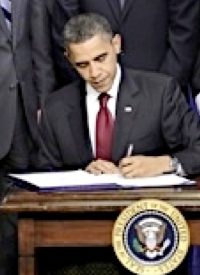
Although President Barack Obama correctly understood that his party had taken a “shellacking” in the November elections, he seems not to have drawn the obvious lesson from that defeat: Americans are unhappy with his policies. Even now, reports the Washington Examiner, he “is expected to make more frequent use of executive orders, vetoes, signing statements and policy initiatives that originate within the federal agencies to maneuver around congressional Republicans who are threatening to derail initiatives he has already put in place, including health care reforms, and to launch serial investigations into his administration’s spending.”
In other words, he is going to ignore the clear message sent by voters and proceed with his agenda by largely unconstitutional means.
The Constitution, after all, vests only the power of tak[ing] Care that the Laws be faithfully executed in the President, not the power of making those laws. The only lawmaking power granted to the President is the choice of signing or vetoing laws duly passed by Congress. Once he signs a law, the President is bound to enforce all of it, not just the provisions with which he agrees. He may not sign a law and then issue a statement saying that he will disregard parts of it. Similarly, the President is barred from issuing executive orders or regulations contrary to duly passed laws.
None of this has prevented power-mad chief executives from taking such measures in the past. George W. Bush, for example, was notorious for his use of signing statements asserting his authority to ignore the laws he was approving, even to the point of claiming that his signing of a ban on torturing prisoners would not prevent him from continuing to approve torture if he believed it to be in the best interest of national security. In response to Bush’s unprecedented flurry of signing statements challenging around twice the number [of provisions] challenged by all previous presidents combined, according to the New York Times the American Bar Association passed a resolution declaring that signing statements are contrary to the rule of law and our constitutional system of separation of powers and that the President should veto a bill if he believes that all or part of a bill is unconstitutional.
The Times points out that Harold Koh, the State Department legal adviser for the Obama administration, was a member of the task force that developed the ABA resolution. But, adds the paper, several other future members of the Obama legal team argued at the time that signing statements were lawful and appropriate so long as the president invoked only mainstream legal theories, which is to say that these liberal Democrats had no problem with the use of signing statements as long as Democrats were the ones issuing them. Not surprisingly, Obama, who had criticized Bush’s signing-statement frenzy, accepted that line of reasoning since it didn’t restrict his own power; and since taking office, writes the Examiner, Obama [has] issued signing statements on budgetary matters, foreign aid, commission appointments and more along with a memorandum promising to use restraint whenever exercising that power.
Obama, the Times reports, is considering attaching a signing statement to a bill funding the ongoing, unconstitutional wars in Iraq and Afghanistan. The bill, passed by the Democrat-controlled lame-duck Congress, includes provisions making it more difficult for the administration to transfer prisoners from the Guantanamo Bay military prison to other locations. (Three days into his presidency, Obama signed an executive order declaring that the prison would be closed within a year; nearly two years have now passed, and the prison remains open.) One provision bars the military from using its funds to transfer detainees to the United States, making it harder to prosecute them in federal court, according to the Times. Another prohibits the transfer of detainees to any other country unless the defense secretary, Robert M. Gates, certifies that the country has met a strict set of security conditions.
The paper reports that Obama will probably sign the bill despite his misgivings about these provisions, so he is therefore considering performing an end run around Congress by issuing a signing statement asserting that as the head of the executive branch and commander in chief, his prosecutorial discretion and wartime powers would allow him to lawfully bring detainees into the United States for trial or to transfer them to other countries as he sees fit.
There are two problems with this assertion. First, since there are no congressional declarations of war in effect at the present time, the President has no wartime powers to exert. Second, the Constitution explicitly gives Congress both the power of the purse and the authority to make Rules concerning Captures on Land and Water, both of which would seem to provide the legislature with the wherewithal to enact the provisions that the administration claims are unconstitutional. If Obama disagrees, he should veto the bill, not sign it and then disregard the provisions he doesn’t like.
As mentioned above, the President may also choose to use executive orders or regulatory agencies to circumvent constitutional and legal restrictions on his power. Obama, the Examiner writes, hasn’t hesitated to make policy through executive order, including freezing federal workers pay, launching an investigation of the BP oil spill and cracking down on Somali outlaws. Likewise, his administration recently reinstated ObamaCare’s end-of-life counseling (not exactly death panels but a possible precursor to them) via regulation after they had been stripped from the healthcare reform bill before it passed Congress.
This week, according to the Examiner, the Environmental Protection Agency begins regulating greenhouse gas emissions at some energy plants and factories a move Obama pushed for after his cap-and-trade environmental legislation stalled in Congress. The paper notes that the move angered many Republicans, who are vowing to block the new regulations they say threatens [sic] the nations fragile economic recovery and who objected to an end-run around the legislative process.
Although Republican strategist Matt Mackowiak told the Examiner that its unclear what recourse Republicans have, in fact there is one perfectly serviceable weapon in their arsenal: the 1996 Congressional Review Act, which allows the Senate to hold an up-or-down vote on any regulation within 60 days of its publication in the Federal Register. Congressional Quarterly reported in late November that the incoming GOP Congress was considering using the act to undo ObamaCare-related regulations. There is no reason they couldn’t use it to stop the back-door cap-and-trade regulations, as well as other Obama administration attempts to make, rather than simply enforce, laws.
A battle for supremacy is shaping up in Washington. On one side is Obama, who wants to rule by fiat and disregard the wishes of voters. On the other side is Congress, which not only (to quote Mackowiak) feels that they should control the laws that affect people but, in fact, is the only branch of the government that has the constitutional authority to do so. Legislators from both parties who either oppose the administrations policies or simply care about Congress primacy in the legislative process need to gird themselves for the fight and deploy every means at their disposal to protect what is left of Congress turf. The alternative is dictatorship from 1600 Pennsylvania Avenue.
Photo: AP Images



